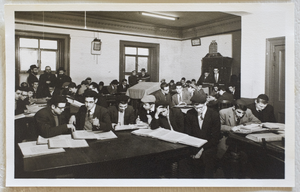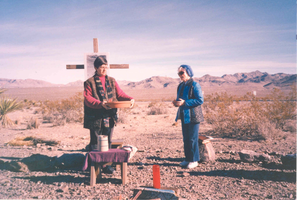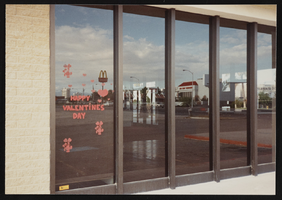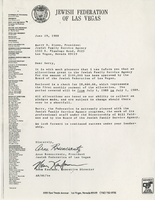Search the Special Collections and Archives Portal
Search Results

Photographs from a Torjman family photo album, 1950s-1993
Date
Archival Collection
Description
Group of photographs from a family album show the students at Sunderland Talmudical College in England, the wedding reception of David and Iris Torjman at Temple Beth Sholom's Ruby Kolod Center, and the Torjman family traveling in Israel and Morocco.
Image

Sister Rosemary Lynch and an unidentified protestor on Ash Wednesday: photographic print
Date
Archival Collection
Description
Image

The Evangelism Training Center: photographic prints
Date
Archival Collection
Description
Image

Jewish Federation correspondence, meeting minutes, and other records, item 12
Description
A book recommendation for "Family Corner" written by Bill Feldman, the Executive Director of the Jewish Family Service Agency. The book is titled "Raising Your Child to be a Mensch."
Lola Falana recordings, 1978 to 1984
Level of Description
Scope and Contents
Falana discusses her upcoming album, recent performances, early career, body image, childhood poverty, relatability, and standing up for her principles; Falana answers questions from callers; Falana chats about life changes, and personal feelings; Falana discusses her childhood, her personality, and her views on growing older; Falana discusses religion, reincarnation, past life regressions, abortion, and homosexuality; Falana talks about how music for listening is coming back, romance, politics, common sense, and bowling with Rip Taylor and Sammy Davis Jr.
Falana talks about how she handles stress and answers call-in questions about her health issues, fear of cancer, dieting, and fasting; Falana talks about why she was blacklisted from the Johnny Carson Show for supporting Wayne Newton, how she was almost sold into prostitiution, and politics.
Archival Collection
Collection Name: Arnold Shaw Interviews and Performance Recordings
Box/Folder: Digital File 00
Archival Component
Tyrone L. Seals oral history interviews
Identifier
Abstract
Oral history interviews with Tyrone L. Seals conducted by Claytee D. White and Sarah Beth Hawkins on April 25, 2016 and May 16, 2016 for the African Americans in Las Vegas: a Collaborative Oral History Project. In the first interview, Seals discusses his upbringing in Las Vegas, Nevada and growing up in the Westside. He talks about experiencing discrimination, employment limitations, and entertainment on Jackson Street. In the second interview, Seals remembers school integration, organizations for African American women, and protests during the 1960s. Lastly, Seals discusses the significance of religion in the African American community and becoming a pastor.
Archival Collection
Maria Banks oral history interview
Identifier
Abstract
Oral history interview with Maria Banks conducted by Barbara Hoyt on September 23, 1972 for the Ralph Roske Oral History Project on Early Las Vegas. Banks discusses her experiences managing a jukebox company, owning and operating two restaurants, and working for a music company. She also discusses her Mormon religion and the relationship she had with her late husband. Banks also discusses the change in climate over time, specifically the increasing humidity.
Archival Collection

Video, Yom Hashoah Holocaust Memorial Day Observance at the Governor's Mansion, April 4, 2013
Date
Archival Collection
Description
Video recording of Yom Hashoah event held at the Governor's Mansion in Carson City, Nev.
Moving Image
Rabbi Bernard Cohen Papers
Identifier
Abstract
The Rabbi Bernard Cohen Papers (1957-1984) consist of mainly bulletins for the Las Vegas Jewish Community Center (later known as Temple Beth Sholom). Other materials in this collection include correspondence to and from Rabbi Cohen and certificates of conversion signed by Cohen. The collection also includes a eulogy for Cohen written by Rabbi Wise as well as an advertisement for Cohen's book
Archival Collection

Jewish Federation correspondence, meeting minutes, and other records, item 20
Description
Letters to Barry D. Eisen, President of the Jewish Family Service Agency, and William Feldman, Executive Director of the Jewish Family Service Agency, about funding, June 1988.
